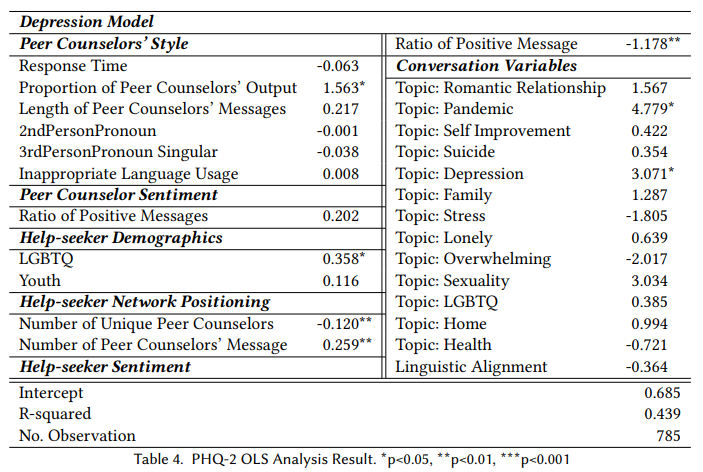Connecting Self-report Questionnaires and Behaviors to Analyze Mental Health Changes in Online Peer Counselling
Secondary analysis to determine factors that lead to positive changes in help-seekers' mental health.
Online peer support is known as an effective source for people who suffer from mental disorders to seek support. However, it remains unclear which factors lead to positive changes in help-seekers' mental health. In this paper, we performed a secondary analysis using data from 7 Cups - a widely used online community for people with mental health issues. Leveraging data from 7 Cups, we examined how various factors, including peer counselors' strategies, help-seekers' activities, and conversation features, affect the help-seekers' mental health improvement. We found that help-seekers benefited the most when their peer counselors listened more and talked less. Help-seekers with depression symptoms need professional help rather than chatting in peer counselling. Besides, a vast social network and positive utterances from help-seekers led to more positive mental health changes for themselves. Our work shows methodological and design implications for online peer-supported based mental health platforms.

Good mental health and psychological well-being are essential to our life. More than forty-six million Americans aged 18 and older -- about 1 in 5 adults -- suffer from mental disorders. With clinical therapies widely proven as effective, the high expense, low accessibility, and high demand for clinical support all become barriers that prevent individuals from receiving proper support. To address these issues, people increasingly turn to their peers for help. Such peer support takes various forms; in particular, internet-based peer counseling has flourished in recent years. Prior studies have shown positive outcomes from the use of non-professionals to deliver mental health interventions, some of which even excelled traditional clinician therapies where clients demonstrated to have received more empathy.
However, the quality of these peer counseling sessions varies greatly. For peer counselors who are unlikely to have received professional training, there is always the risk that the counseling might not be conducted appropriately or might even exacerbate the conditions of help-seekers. Attributes of both help-seekers and peer counselors could affect the effectiveness of counseling sessions. For example, factors including peer counselors' strategies, language usage, and help-seekers' participation during the session could all play a role. A rich body of prior literature focuses on how individual conversations affect help-seekers' mental health. Evaluating individual conversations' effectiveness could, however, be noisy and unstable on relatively stable measurements such as anxiety and depression. Alternatively, an accumulation of conversations in a period may have a significant influence on the help-seekers.
Assessing the quality of millions of these peer counseling conversations is not easy. In previous work, approaches including human assessment, feature-based annotations, and questionnaires were adopted. In these methods, the alleviation of help-seekers' mental disorders after counseling is commonly used as a measurement for counseling quality. Questionnaires such as Patient Health Questionnaire have been widely used as self-administered diagnostic instruments for measuring depression. It has been validated as the method for clinical diagnosis. Despite its high accuracy, very few prior studies leverage these for large-scale, self-report evaluation of online peer counseling sessions, possibly due to the challenges in collecting such questionnaire data in large quantities.
In this project, we conducted a secondary analysis to examine which attributes of help-seekers, peer counselors, and conversation are associated with help-seekers' mental status change in online peer counseling. Our work used self-report questionnaire results to represent help-seekers' mental health status and analyze how aggregated activities and features in a two-to-three week window affect help-seekers' mental health change. Specifically, we obtained 46,340 PHQ-2 questionnaire results from 41,475 distinct help-seekers of 7 Cups, a large online peer-counseling platform dedicated to mental health issues.
After filtering, we used 785 qualified PHQ-2 time windows and built features related to help-seekers, peer counselors, and conversation perspectives. We utilize independent sample t tests to distinguish the characteristics of behaviors of help-seekers who may suffer from depressive disorders and then performed a secondary analysis to observe which features are highly correlated with their mental health status change using linear regression models. We found that peer counselors who talk less and listen more are associated with the better mental health status of the help-seekers. For help-seekers' behaviors, a larger peer-to-peer counseling network on 7 Cups helps them improve their mental health status. A high ratio of positive utterances from help-seekers could help them to improve their mental wellness. However, peer counseling was not as effective for help-seekers who are self-identified as LGBTQ, nor was it helpful for help-seekers who wanted to talk about issues that require professional knowledge such as depression related topics. To the best of our knowledge, this is the first large-scale computational analysis of self-report mental health outcome changes. We believe that our findings can provide new perspectives for future research about the online mental health community and valuable insights for platform design.